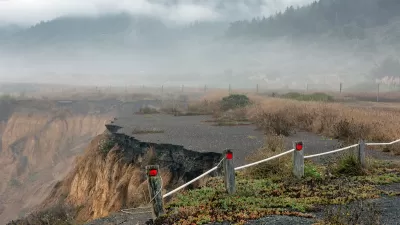Billions of people will have to relocate in the next decades. Are governments prepared?

As climate disasters make some parts of the world increasingly unlivable, billions of people — an estimated 3.5 billion by 2070 — will have to relocate to safer ground.
As Ayana Elizabeth Johnson explains in a piece for Wired, “To date, most climate migration has occurred within nations, but as the regions affected by extreme weather expand, that will need to change.”
We will have to be vigilant about keeping xenophobia at bay, acknowledging the cruel injustice at play as the lowest greenhouse gas emitting nations, like the Pacific islands, are the first to be inundated.
Johnson notes that governments at all levels are starting to take note, creating policies such as relocation buyouts and limiting new developments in risky areas. To prepare for relocating its residents once sea levels make the island unlivable, the government of the South Pacific nation of Kiribati purchased land in Fiji.
“Already, 11 percent of Americans have considered moving to avoid the impacts of global warming, and roughly 75 percent are hesitant to buy homes in areas with high climate risks like wildfires (more than 30 million homes in the lower 48 US states are at risk of being hit with wildfires).” Meanwhile, insurance companies are hiking rates or pulling out of certain areas altogether.
As Johnson points out, governments will need proactive policies to manage the climate migration that will become a fact of life. “It’s not that people want to move, to leave the communities and ecosystems they love and call home; it's that they must.”
FULL STORY: The Climate-Driven Diaspora Is Here

Alabama: Trump Terminates Settlements for Black Communities Harmed By Raw Sewage
Trump deemed the landmark civil rights agreement “illegal DEI and environmental justice policy.”

Study: Maui’s Plan to Convert Vacation Rentals to Long-Term Housing Could Cause Nearly $1 Billion Economic Loss
The plan would reduce visitor accommodation by 25% resulting in 1,900 jobs lost.

Why Should We Subsidize Public Transportation?
Many public transit agencies face financial stress due to rising costs, declining fare revenue, and declining subsidies. Transit advocates must provide a strong business case for increasing public transit funding.

Paris Bike Boom Leads to Steep Drop in Air Pollution
The French city’s air quality has improved dramatically in the past 20 years, coinciding with a growth in cycling.

Why Housing Costs More to Build in California Than in Texas
Hard costs like labor and materials combined with ‘soft’ costs such as permitting make building in the San Francisco Bay Area almost three times as costly as in Texas cities.

San Diego County Sees a Rise in Urban Coyotes
San Diego County experiences a rise in urban coyotes, as sightings become prevalent throughout its urban neighbourhoods and surrounding areas.
Urban Design for Planners 1: Software Tools
This six-course series explores essential urban design concepts using open source software and equips planners with the tools they need to participate fully in the urban design process.
Planning for Universal Design
Learn the tools for implementing Universal Design in planning regulations.
Smith Gee Studio
Alamo Area Metropolitan Planning Organization
City of Santa Clarita
Institute for Housing and Urban Development Studies (IHS)
City of Grandview
Harvard GSD Executive Education
Toledo-Lucas County Plan Commissions
Salt Lake City
NYU Wagner Graduate School of Public Service





























